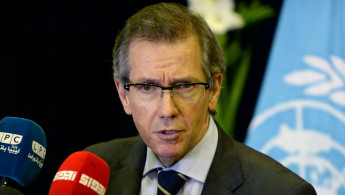Libya's rival governments reach 'consensus'
Libya's rival governments have reached a "consensus" on the main elements of a political agreement, a UN special envoy told reporters early Sunday.
Bernardino Leon said in Skhirat, Morocco that the two sides were able to "overcome their differences" on major outstanding issues, increasing the likelihood of signing a long-awaited agreement to form a unity government this month.
He called it the first time "that we have the possibility to make it and to have this agreement with the all the parties, all the key parties in Libya onboard," adding that both sides have made compromises.
"We know that it is going to require a lot of work, but we believe that it will be possible to reach this deadline of the 20th of September with an agreement that will be signed," said Leon.
The most recent text of the draft agreement was not immediately available.
Leon has been trying to get the parties to present candidates for prime minister and two deputies to lead a national unity government to bring the war-torn country out of its crisis.
| The Tripoli government has been given 48 hours to submit names for leadership positions in a unity government. |
He said the Tripoli government has been given 48 hours to submit names for leadership positions in a unity government, adding that the Tobruk-based government has already provided names.
Libya's warring factions began the negotiations on Thursday in an attempt to end their conflict, with the UN envoy telling factions they must reach a final deal by Sept. 20.
Western powers are pressing for the UN sponsored deal to form a unity government between the two rival factions whose conflict is pushing the North Africa state deeper into chaos four years after rebels ousted Muammar Gaddafi.
An internationally recognised government and elected parliament has operated out of the east of the country since last year when an armed faction called Libya Dawn took over Tripoli and set up its own self-declared government.
"We are very hopeful that they (the parties) will understand that the deadline of Sept. 20 must be the last one, must be the one that will allow Libya to get out of the crisis," Leon told reporters.
Leon did not say what would happen if his Sept. 20 deadline was not met. The target date for an agreement has been repeatedly pushed back. The mandate of the House of Representatives, seat of Libya's internationally recognized government, expires in October, adding pressure for a deal.
Delegates from the international recognised government have already accepted a preliminary deal, but the Tripoli faction has yet to agree.
Negotiators from both sides are under pressure from hardliners who see they can still gain from continued conflict. Military forces on both sides are loose alliances of former anti-Gaddafi rebels who turned against each other or whose loyalties are more to tribal or regional allegiances.
But Libya's turmoil is an increasing concern for European leaders as Islamic State militants gain ground there and smugglers take advantage of the chaos to ship thousands of migrants across the Mediterranean Sea to Europe.





 Follow the Middle East's top stories in English at The New Arab on Google News
Follow the Middle East's top stories in English at The New Arab on Google News


